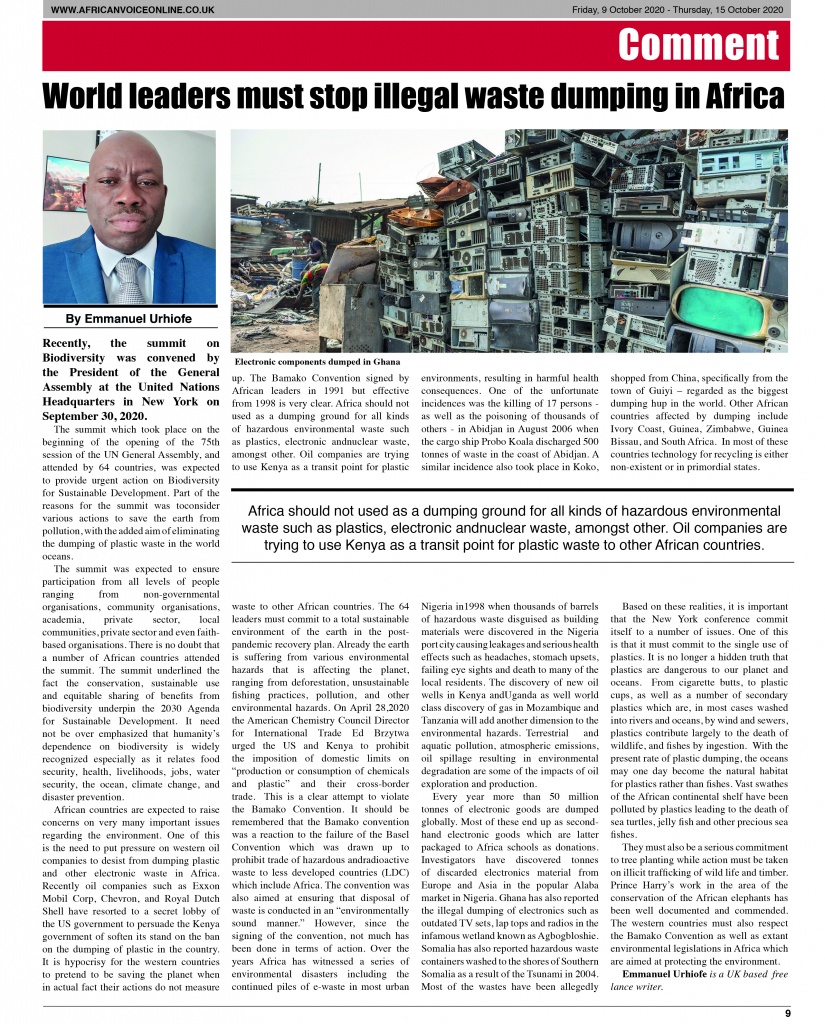


Recently, the summit on Biodiversity was convened by the President of the General Assembly at the United Nations Headquarters in New York on September 30, 2020.
The summit which took place on the beginning of the opening of the 75th session of the UN General Assembly, and attended by 64 countries, was expected to provide urgent action on Biodiversity for Sustainable Development. Part of the reasons for the summit was toconsider various actions to save the earth from pollution, with the added aim of eliminating the dumping of plastic waste in the world oceans.
The summit was expected to ensure participation from all levels of people ranging from non-governmental organisations, community organisations, academia, private sector, local communities, private sector and even faith-based organisations. There is no doubt that a number of African countries attended the summit. The summit underlined the fact the conservation, sustainable use and equitable sharing of benefits from biodiversity underpin the 2030 Agenda for Sustainable Development. It need not be over emphasized that humanity’s dependence on biodiversity is widely recognized especially as it relates food security, health, livelihoods, jobs, water security, the ocean, climate change, and disaster prevention.
African countries are expected to raise concerns on very many important issues regarding the environment. One of this is the need to put pressure on western oil companies to desist from dumping plastic and other electronic waste in Africa. Recently oil companies such as Exxon Mobil Corp, Chevron, and Royal Dutch Shell have resorted to a secret lobby of the US government to persuade the Kenya government of soften its stand on the ban on the dumping of plastic in the country. It is hypocrisy for the western countries to pretend to be saving the planet when in actual fact their actions do not measure up. The Bamako Convention signed by African leaders in 1991 but effective from 1998 is very clear. Africa should not used as a dumping ground for all kinds of hazardous environmental waste such as plastics, electronic andnuclear waste, amongst other. Oil companies are trying to use Kenya as a transit point for plastic waste to other African countries. The 64 leaders must commit to a total sustainable environment of the earth in the post-pandemic recovery plan. Already the earth is suffering from various environmental hazards that is affecting the planet, ranging from deforestation, unsustainable fishing practices, pollution, and other environmental hazards. On April 28,2020 the American Chemistry Council Director for International Trade Ed Brzytwa urged the US and Kenya to prohibit the imposition of domestic limits on “production or consumption of chemicals and plastic” and their cross-border trade. This is a clear attempt to violate the Bamako Convention. It should be remembered that the Bamako convention was a reaction to the failure of the Basel Convention which was drawn up to prohibit trade of hazardous andradioactive waste to less developed countries (LDC) which include Africa. The convention was also aimed at ensuring that disposal of waste is conducted in an “environmentally sound manner.” However, since the signing of the convention, not much has been done in terms of action. Over the years Africa has witnessed a series of environmental disasters including the continued piles of e-waste in most urban environments, resulting in harmful health consequences. One of the unfortunate incidences was the killing of 17 persons – as well as the poisoning of thousands of others – in Abidjan in August 2006 when the cargo ship Probo Koala discharged 500 tonnes of waste in the coast of Abidjan. A similar incidence also took place in Koko, Nigeria in1998 when thousands of barrels of hazardous waste disguised as building materials were discovered in the Nigeria port city causing leakages and serious health effects such as headaches, stomach upsets, failing eye sights and death to many of the local residents. The discovery of new oil wells in Kenya andUganda as well world class discovery of gas in Mozambique and Tanzania will add another dimension to the environmental hazards. Terrestrial and aquatic pollution, atmospheric emissions, oil spillage resulting in environmental degradation are some of the impacts of oil exploration and production.
Every year more than 50 million tonnes of electronic goods are dumped globally. Most of these end up as second-hand electronic goods which are latter packaged to Africa schools as donations. Investigators have discovered tonnes of discarded electronics material from Europe and Asia in the popular Alaba market in Nigeria. Ghana has also reported the illegal dumping of electronics such as outdated TV sets, lap tops and radios in the infamous wetland known as Agbogbloshie. Somalia has also reported hazardous waste containers washed to the shores of Southern Somalia as a result of the Tsunami in 2004. Most of the wastes have been allegedly shopped from China, specifically from the town of Guiyi – regarded as the biggest dumping hup in the world. Other African countries affected by dumping include Ivory Coast, Guinea, Zimbabwe, Guinea Bissau, and South Africa. In most of these countries technology for recycling is either non-existent or in primordial states.
Based on these realities, it is important that the New York conference commit itself to a number of issues. One of this is that it must commit to the single use of plastics. It is no longer a hidden truth that plastics are dangerous to our planet and oceans. From cigarette butts, to plastic cups, as well as a number of secondary plastics which are, in most cases washed into rivers and oceans, by wind and sewers, plastics contribute largely to the death of wildlife, and fishes by ingestion. With the present rate of plastic dumping, the oceans may one day become the natural habitat for plastics rather than fishes. Vast swathes of the African continental shelf have been polluted by plastics leading to the death of sea turtles, jelly fish and other precious sea fishes.
They must also be a serious commitment to tree planting while action must be taken on illicit trafficking of wild life and timber.Prince Harry’s work in the area of the conservation of the African elephants has been well documented and commended.The western countries must also respect the Bamako Convention as well as extant environmental legislations in Africa which are aimed at protecting the environment.
Emmanuel Urhiofe is a UK based freelance writer.
Kindly follow us on twitter:@AfricanVoice2









